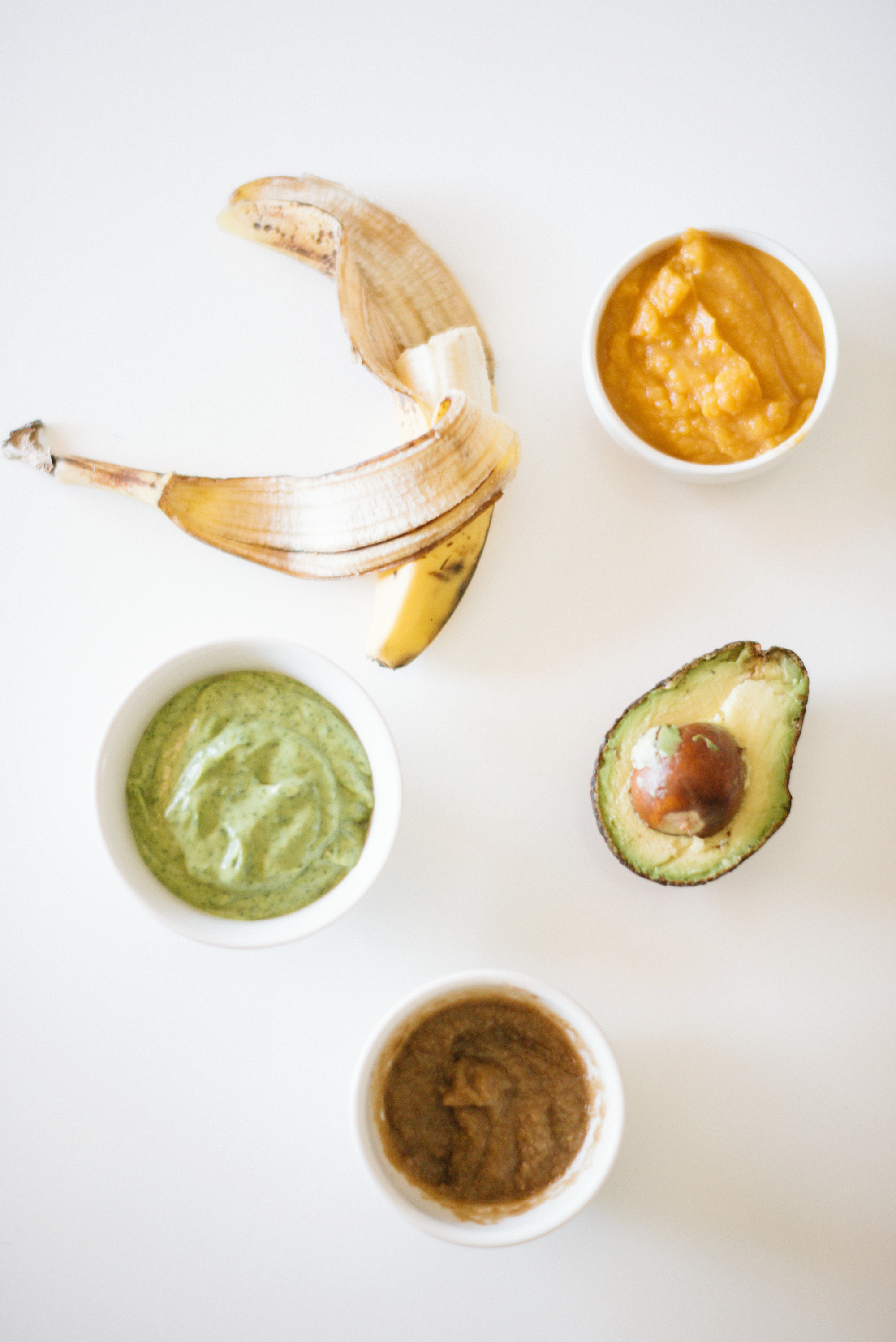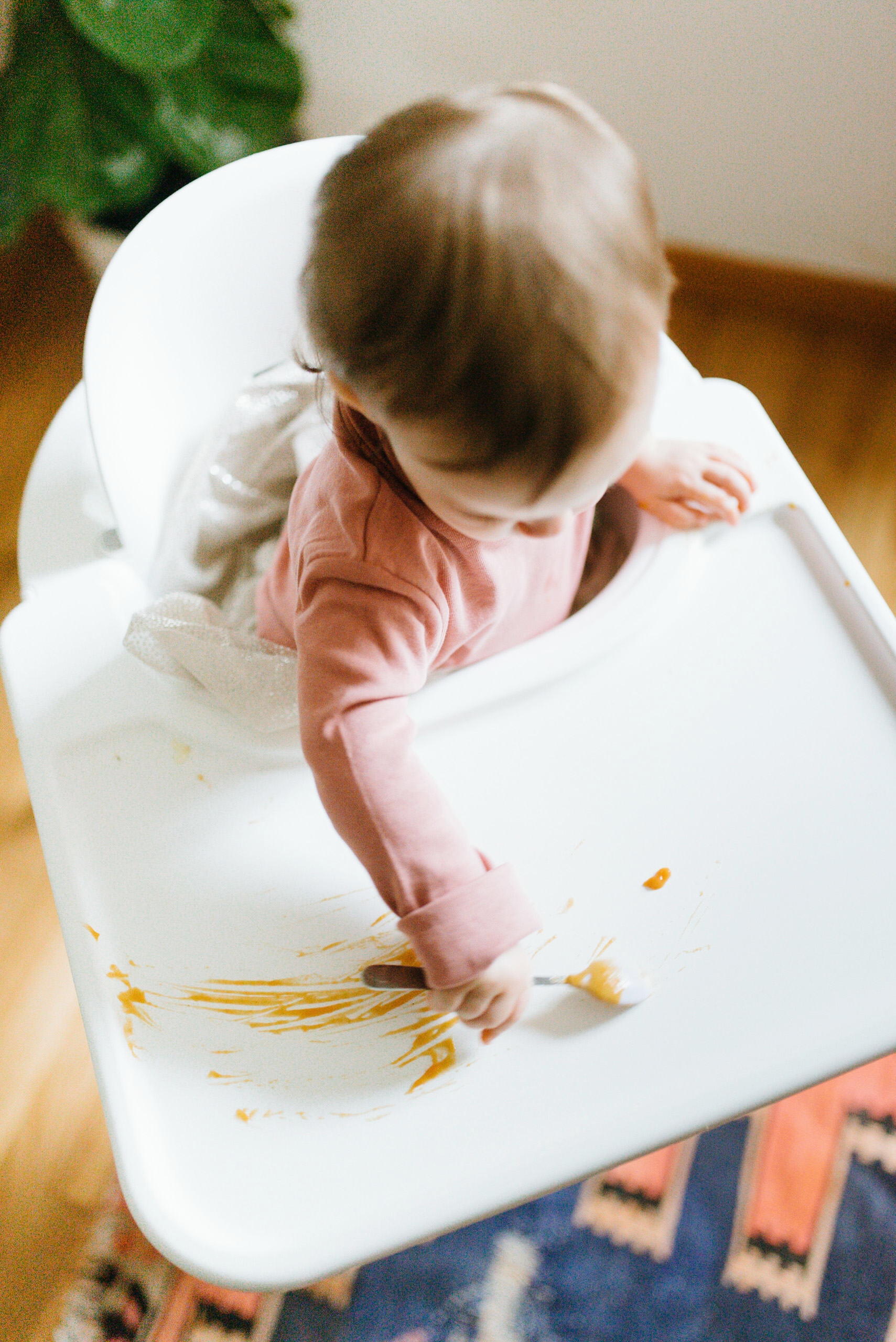
It’s hard to believe that Flora is almost ready to start solid foods! It’s also hard to believe how much you forget between kids — I couldn’t remember when to introduce solids or what to start with and I know that so many other mamas are in the same boat. I get messages about it all the time! It can be overwhelming and confusing and for some reason there’s just not a ton of information provided to parents on the topic. Today I’ve partnered with 1,000 Days – a nonprofit that focuses on improving nutrition for moms and babies to answer MY questions on introducing solids and how to do it! 1,000 Days also just released a really great set of quick, informative videos on the topic which are linked throughout below.
*As always, The Mama Notes is not a medical authority, please check with your doctor if you have questions about introducing solids to your baby.
How do you know if your baby is ready for solids? We hear so much conflicting information online and from pediatricians!
Parents get a lot of varied advice- especially when it comes to health and nutrition. In fact, more than half of moms say they receive mixed messages about introducing solid foods. And although people usually mean well, a lot of that advice is not based on fact or science. That’s why 1,000 Days– a nonprofit organization focused on improving nutrition for moms and babies- is excited to be partnering with the Centers for Disease Control and Prevention (CDC) to help translate the science on infant and toddler nutrition into information that parents can easily digest (no pun intended!).
So, how do you know if your baby is ready for solids, meaning any food other than breast milk or formula? Watch this bite-sized video and look for these signs:
- Your baby has good head control. Your baby can keep his or her head steady in an upright position.
- Your baby can sit up with little or no support. Your baby needs to be able to sit upright in a highchair to swallow well.
- Your baby is able to grab objects. Your baby uses his or her hands to grab and hold onto objects, like a spoon.
- Your baby shows interest in what others are eating. Your baby opens his or her mouth and leans forward when food is offered.
- Your baby is about 6 months old. At around 6 months of age your baby’s gut has developed to digest foods other than breast milk or formula.
If your baby can do ALL of these things then he or she is ready to try first foods! Breast milk and/or formula will remain the main source of nutrition for your baby throughout the first year. But by exposing your baby to healthy foods once they are ready, you are teaching your baby healthy eating habits that can last a lifetime!
Should you wait until your baby can 100% sit up independently before starting solids?
Your baby’s ability to sit up on their own is an important part of determining if he is ready to start solid foods. It is important for two reasons: development and safety.
In terms of development, good stability actually helps little ones to eat. Having good head control and trunk control (ability to sit upright) are essential motor skills for your baby to coordinate his jaw, tongue and lips for chewing and swallowing.
On the safety front, you want your baby to be able to sit upright in a high chair to swallow well. Reclined positions pose higher risk of choking- so your safest option is to keep baby upright while eating. Most high chairs come with additional support to help keep your baby in an upright position during the duration of mealtime.
Should parents skip rice cereal all together?
The short answer is- some rice cereal is OK as long as it is part of a balanced diet. But rice cereal should not be the main source of your baby’s diet. And here’s why: rice cereal could contain arsenic, a cancer-causing toxin that could lead to developmental concerns in infants.
Rice cereal used to be a common part of a baby’s diet- in fact infants were consuming about three times more rice than adults because of rice cereal- and that’s a lot for such a small body! But now, a better option for grains is to offer a variety of infant cereals like wheat, barley and multigrain that are fortified with iron and zinc; instead of just rice cereal. The big takeaway is that a variety of foods and a well-balanced diet that includes foods from different food groups is important – not just for us adults but for our babies as well! Searching for a good first food instead of rice cereal? Check out this short video on “What is a good first food for your baby?”
To learn more, check out the FDA’s consumer health information on arsenic in rice cereal.
When should you introduce water and in what type of cup?
Once you start introducing solid foods to your baby at around 6 months old, you can also begin to introduce water. But just plain water! No need to get fancy with added flavors (or even other beverages like juice, tea or soda). At this early age it is important for babies to learn to like the flavor of plain water.
We also recommend offering water in a cup (a sippy cup with a lid is fine for early learners). While breast milk and/or formula may be fed in a bottle, dedicating a cup to water will give your baby practice in developing the motor skills needed to feed him or herself. At around 9 months your child can start learning how to use a cup without a lid. Just be ready for some spills! And when your child is about 12 months old, you may see that he is able to hold a cup with two hands.
Watch this short video “What should your baby be drinking?” to learn more.
When should solid food be given during the day (when a child is hungry or after feeding)?
In terms of the best time of day to introduce foods, try to introduce a new food while you are home with your baby (instead of asking your childcare provider or someone else to do it). This way you can observe your baby for any adverse reactions.
When introducing solid food for the first time, try offering a small amount at first- 1 to 2 teaspoons is fine. And then if your baby is still hungry, offer him breast milk or formula. You can then gradually increase the amount of solid food while paying attention to your baby’s hunger and fullness cues.
How long should you wait between introducing new foods?
If there is a family history of a food allergy it is recommended to wait 3-5 days before introducing a new food. This way you can watch for any signs of an allergic reaction- like diarrhea, rash or vomiting. But if there is no family history of food allergies, then you don’t necessarily have to wait a few days between introducing new foods. The most important thing: have fun with these first foods!
To learn more about What To Expect When Introducing First Foods check out this short video.
Images by Anna Reynal

How And When To Introduce Solids To Your Baby!
VIEW THE COMMENTS